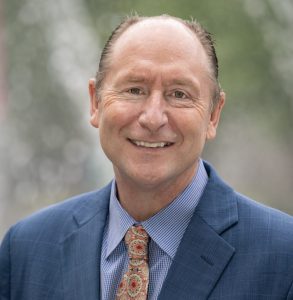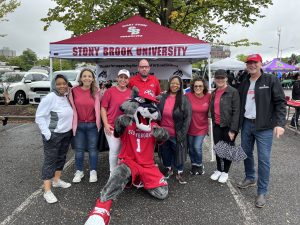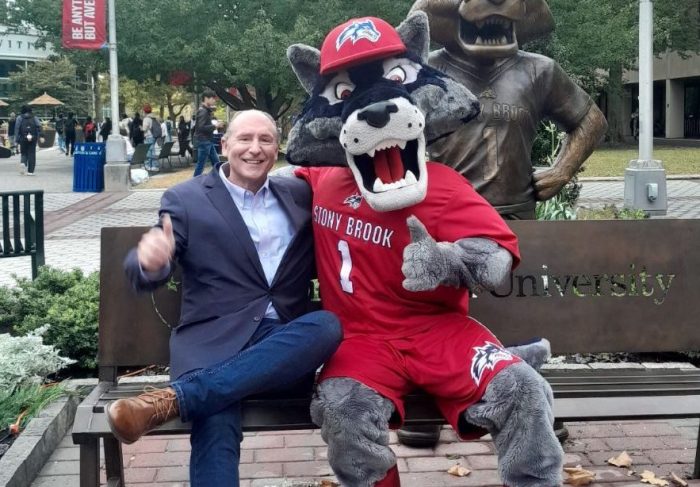SBU Dean of College of Arts and Sciences David Wrobel shares his perspective and focus
By Daniel Dunaief
David Wrobel, dean of the College of Arts and Sciences at Stony Brook University since August, can relate to the school’s students.
Like about a third of the students at the downstate flagship SUNY university, Wrobel is the first member of his family to attend college.

“I’ve had the advantage of that social mobility that higher education can provide,” said Wrobel, who grew up in England. To have the opportunity to facilitate that for thousands of other students is “hugely important and meaningful.”
Provost Carl Lejuez appreciates Wrobel’s passion for education and for providing opportunities to students from a wide array of backgrounds and experiences.
“For first generation students, there are some challenges that even the most empathetic, well-meaning person may want to help with, but because they don’t have that experience, they don’t know,” said Provost Carl Lejuez. “He brings both the experience of some of the things these students are going through as well as the humanity and personality that is very empathetic.”
Indeed, for Wrobel, who was dean at the University of Oklahoma for six years before joining Stony Brook, his new job appealed to him because of the opportunity to use education to help students expand their horizons and seek new opportunities.
Stony Brook has been successful in the area of social mobility, enabling students “from more disadvantaged backgrounds coming to the university” to complete their degrees at a high rate, said Wrobel. Higher education can perform the role it should as an “engine of democracy.”
Wrobel, who is a tenured professor in the Departent of History, oversees the breadth and depth of offerings at Stony Brook.
Lejuez suggested that Wrobel relates well to students from every background.
“You never see him at an event talking to other administrators,” said Lejuez. “He’s trying to really get in there and talk to people and make them feel welcome.”
Indeed, within his first few weeks of arriving, Wrobel met with several students who shared their concerns about visual arts, particularly as the music and art departments are about to move during an HVAC renovation project.
Wrobel worked with the students and partners around the university, including staff, the fire marshal and others, to see where they can display artwork and perform music.
The Arts Everywhere effort, which is “big in spirit” but “small in funding” provides an opportunities for the “work of students to be better understood by other students on campus,” Wrobel said.
Research opportunities
As a member of the Association of American Universities, an exclusive club that recognizes universities committed to research and education, Stony Brook provides students with opportunities to contribute to the forefront of new information.
“We have undergraduates doing research on genes that are led by some of the most important scientists in the world,” said Wrobel. These students are “not doing research that is tangentially associated with important science. They are contributing to the research teams” that lead to societal and life improvements.
These research contributions across a wide range of fields can and should address the question some people have asked about the return on investment of a college education.
Students are working in fields such as quantum science, artificial intelligence, climate and health.
“We should take great pride in the fact that, as a university, we are answering that question: why does a degree matter,” said Wrobel.
‘Not a spectator sport’

The university is incorporating into the degree programs the kind of learning experiences that prepare students for success in areas ranging from private and industry positions to government jobs.
Wrobel is eager to demonstrate how “education is not a spectator sport” with every prospective student and their parents. Students become a “full participant not just in learning existing knowledge, but in the process of creating new knowledge.”
At the same time, the university is committed to enhancing the abilities of its educators.
“You work to reward teaching excellence at every level,” said Wrobel. “You make it clear that teaching does matter.”
Teachers need to refine their approaches and methods based on the way students learn, which includes working with technology and its possibilities more effectively than in the past
Wrobel meets with the Dean’s Student Advisory Committee, which includes students from numerous majors, to learn about student needs. These can include expanding quieter study spaces or finding places for more collaborative work.
Additionally, the committee helps select outstanding teaching faculty.
“Faculty go to conferences to improve their research skills,” said Lejuez. “We want to think about teaching in the same way.”
Lejuez appreciates how Wrobel engages with students to understand what would improve the university’s learning environment.
The Center for Excellence in Learning and Teaching provides opportunities not only for those educators who might be struggling to connect with their students, but also for those who want to improve their craft, Lejuez said.
As a part of student evaluations of their educators, Stony Brook has improved the quality of questions in its educator evaluations for the spring semester, which Lejuez hopes encourages more students to offer valuable feedback.
A dedicated educator
In addition to serving as an administrator, Wrobel hopes to put his experience to work as an educator himself by next spring.
Wrobel could imagine leading or contributing to several possible classes.
He would enjoy teaching a graduate seminar that addresses the history of American thought and culture from the end of Reconstruction after the Civil War in the 1870’s to the end of the New Deal in the 1940s.
At the University of Oklahoma, he also taught an introductory survey class that first year students typically took. The course covered the period from the end of the Civil War to the present.
“I love the idea that I have the opportunity to engage with brand new students when they come to the university,” he said.
Wrobel would like to share a view of America from the Great Depression through the Vietnam War, focusing on John Steinbecks view of the core political and social debates of the time.
Steinbeck was “better than just about any other author at finding what is extraordinary in the lives of ordinary Americans,” said Wrobel.
As for his roles at Stony Brook, Wrobel is “thrilled to have the opportunity to help first generation students and other financially disadvantaged students find their way.”







